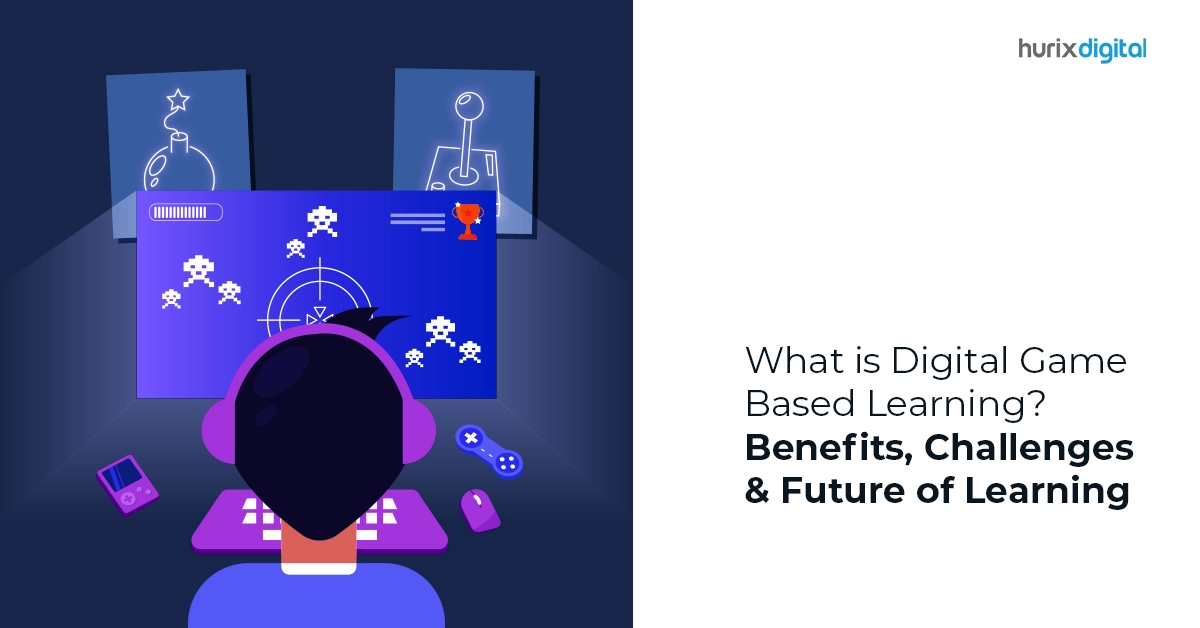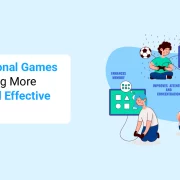
What is Digital Game-Based Learning? Benefits, Challenges & Future of Learning!
Summary
Understand digital game-based learning, including its benefits, challenges, and how it shapes the future of educational experiences through interactive and engaging methods.
E-learning has taken the education industry by storm with its innovative advances and creative use of technology. Among these creative methods, digital game-based learning and gamification are rising astonishingly.
As of 2023, almost around 3.2 billion individuals worldwide engage in gaming. In their transition to the digital realm, these games have captivated and enthralled nearly 40% of the global population. The potential is already being explored; the global gamification market is valued at 18.05 billion USD and is expected to grow to 22.45 billion USD.
In this guide, we will explore what digital game-based learning can offer to educators and learners alike. Read on!
Table of Contents:
- What Is Digital Game-Based Learning?
- What are the Five Perks of Digital Game-Based Learning?
- What are the Challenges of Digital Game-Based Learning to Overcome in 2024?
- The Evolving Landscape of Digital Game-Based Learning in Education’s Future
- Conclusion
What Is Digital Game-Based Learning?
Imagine learning history by building your medieval civilization or mastering physics through a virtual rocket launch. That’s the power of digital game-based learning! It takes the excitement of games and turns them into educational tools, making learning active and practical.
Digital game-based learning reins in the concept of digital games and channels gaming principles to create learning experiences. This innovative method helps eliminate the tedious and monotonous idea of education and motivates learning by making it more active and practical with its gaming elements.
What are the Five Perks of Digital Game-Based Learning?
Below are the benefits and exciting advantages of embracing Digital Game-Based Learning:
1. Explosive Engagement
Digital game-based learning revolutionizes engagement by incorporating interactive modules and captivating storytelling. Students experience a remarkable 48% improvement in learning engagement, while overall motivation sees an impressive 72% boost. This shows the dynamism of digital game-based learning in captivating learners’ attention and fueling their motivation.
2. Enhanced Retention
Game-based learning boosts knowledge retention by incorporating active participation.
Neural connections are formed by engaging the audience with the subject through gaming. The retention is increased through its immersive aspects, directly impacting deeper understanding and memory recall of concepts. This way, learning becomes more than just a passive activity; it transforms into an immersive experience that leaves a lasting impact.
3. Personalized Playgrounds
Tailoring and personalizing a learning module according to an individual’s unique style and progress is a crucial benefit of digital game-based learning. Personalization can also be combined with adaptive AI to improve the learning pace according to the learner’s strengths and weaknesses. This not only makes education more inclusive but also ensures that each learner’s journey is finely tuned to their specific needs and capabilities.
4. Improved Accessibility
Institutions must invest their resources in field trips and guest lectures in traditional classroom education to bring history and experience into learning.
With digital game-based learning and technology, students can access virtual tours and game simulations from anywhere without dependence on such resources. It also breaks down geographical barriers, democratizing access to enriched educational experiences for learners across diverse locations.
5. Live Feedback
Much like all games, another benefit of digital game-based learning is that students and teachers can view live progress and gain instant feedback and guidance on their performance. This allows for learning plans to be tweaked according to the best interest of the students and helps improve learning performance in real time.
Also Read: Is Game-Based Learning the Future of Education?
What are the Challenges of Digital Game-Based Learning to Overcome in 2024?
While digital game-based learning comes with many perks, there are some noteworthy challenges that educators and learners must navigate to fully harness its potential.
1. Development Cost
A significant challenge in the realm of digital-based learning lies in the associated development costs. The financial demands can be formidable obstacles, potentially diverting the trajectory toward optimal learning experiences. This may lead to limited resources being allocated to other crucial aspects of education.
2. Lack of Alignment with the Learning Objective
Keeping the game-based learning module aligned with the learning values is another crucial challenge. Finding the right balance between education and fun is vital because too much of either can cause a loss of engagement and value.
Additionally, ensuring that the game aligns seamlessly with the intended learning objectives can be challenging. This requires careful integration of educational content within the gaming framework to guarantee that the primary focus on learning is not overshadowed by entertainment.
3. Potential for Distraction
Like any form of entertainment, games can be addictive and become distractions from learning if not used properly. With the proper delivery and pace for the learner, this challenge can quickly be tackled and even help with motivation levels for the learner.
The Evolving Landscape of Digital Game-Based Learning in Education’s Future
While many studies point towards a declining attention span, a study noted by Forbes aptly points out that binge-watching several hours of content in one sitting is a basic example of the human capacity for high attention spans.
Here is how digital game-based learning fits right at the heart of the e-learning future:
1. Adaptive Personalization
With AI-powered game-based learning and adaptive feedback, create dynamic storylines that respond to player choices. This level of personalization is critical in developing learning modules that can be sustained far into the future.
2. Scope of Application
The application of digital game-based learning has potential beyond just education; it also accelerates the impact of employee training, healthcare, and even civic engagement.
3. Seamless Integration with Cutting-Edge Technology
The profound impact of game-based learning on learners is significantly attributed to its effortless integration with state-of-the-art technologies, including Virtual Reality (VR) and Augmented Reality (AR). This harmonious blend enhances the overall learning experience, unlocking new dimensions of engagement and interactivity for students.
Also Read: Top 10 Advantages of Game-Based Learning
Conclusion
With immersive stories and interactive exercises, digital game-based learning profoundly impacts learner engagement, motivation, and awareness in the long run. While it comes with financial and delivery challenges, its potential and applications do well to secure the future of learning needs.
To overcome these challenges, it is imperative to allow learning solution experts like Hurix Digital to help minimize the resources and maximize its impact. We are committed to navigating the complexities of digital game-based learning, ensuring its seamless integration into educational frameworks.
Contact us to learn more!

Senior Vice President
A Business Development professional with >20 years of experience with strong capability to sell new solutions and develop new markets from scratch. New Market Entry Specialist with experience of working in two of the largest emerging markets – China & India. Also covered other key markets in APAC, US, EU & ME. Exceptional experience of conceptualizing, ideating and selling new learning technologies like VR AR, etc. across multiple industry verticals.



